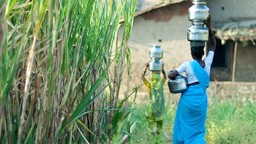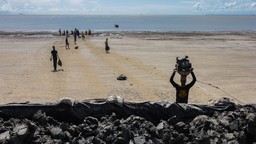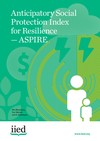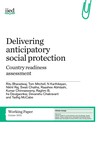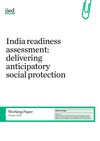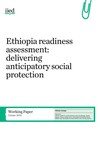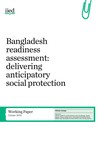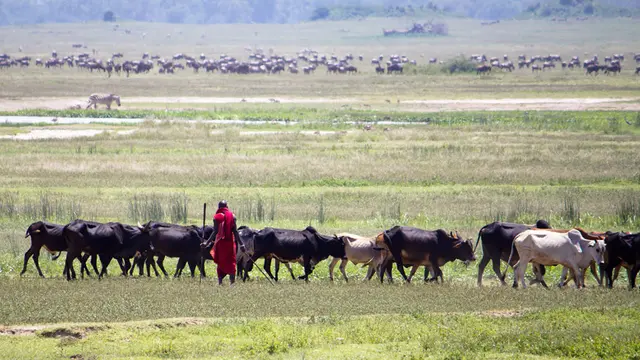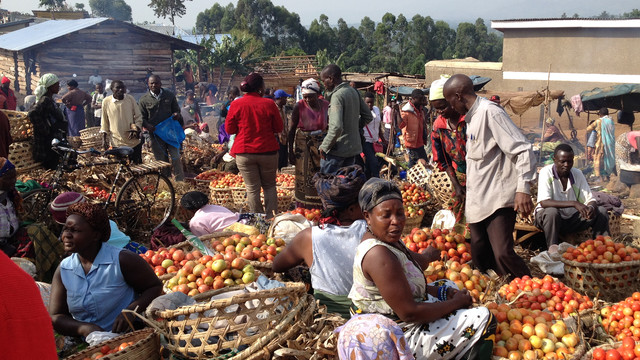Tackling climate change loss and damage by strengthening anticipatory risk response under social protection programmes
Climate change is leading to increasingly devastating impacts on poor and vulnerable people. IIED has developed tools and approaches for existing social protection programmes to help communities better absorb the effects of climate risks, adapt to climate impacts and transform their capacities to address growing climate stresses.
Principal researcher (climate governance and finance team), Climate Change

Community participating in the planning process of a social protection programme – MGNREGS in Raisen, Madhya Pradesh, India (Photo: Ritu Bharadwaj, IIED)
Climate change poses severe and urgent risks, especially to vulnerable communities. Social protection programmes, which have historically focused on poverty alleviation and basic services, are increasingly seen as vital tools for building climate resilience.
Proactive, anticipatory measures in social protection can offer cost-effective resilience against climate shocks, reduce poverty, enhance access to services and prevent distress migration.
These programmes contribute to long-term sustainable development by tackling multiple dimensions of vulnerability, from raising living standards and human development to empowering individuals and fostering economic growth.
However, despite the potential of these programmes, vulnerable countries grapple with challenges in in delivering anticipatory and risk responsive social protection. These challenges include:
- Ineffective targeting of beneficiaries due to limited data and poor information systems
- Inconsistent social protection coverage caused by resource limitations and policy gaps, sometimes resulting in programme duplication
- Underdeveloped early warning systems (EWSs) that lack comprehensive climate hazard coverage, particularly in least developed countries (LDCs)
- Inefficient decision making and delivery mechanisms, and
- The difficulty of coordination among various stakeholders and sectors during crisis.
What is IIED doing?
IIED is developing tools and strategies that can provide a structured, evidence-based approach for delivering social protection programmes to vulnerable communities in a timely and targeted manner.
This work will:
- Inform decision making by empowering policymakers in LDCs and Small Island Developing States (SIDS) to make more informed decisions by identifying gaps, strengths and areas for improvement in social protection programmes.
- Provide guidance to funding agencies on targeted and effective resource allocation to maximise impact and build resilience in vulnerable communities, and
- Facilitate continuous improvement by providing development agencies and practitioners with a framework for evidence based assessment, fostering knowledge sharing and capacity building for better programme design and delivery.
Anticipatory Social Protection Index for Resilience (ASPIRE)
IIED has developed ASPIRE, which is a diagnostic tool designed to assess the readiness of a country's existing social protection programmes to deliver climate resilience.
Working at two levels, the tool assesses a country's overarching social protection policies and systems, guided by 36 indicators that cover policy objectives, innovation, risk definitions, target specifications, planning and budgeting process, and types of assistance.
At the second level, ASPIRE examines specific programmes being implemented, evaluating their design features and functions using a combined set of 33 indicators. These indicators cover aspects such as cash transfers, public works, food assistance and their efficacy in delivering resilience outcomes such as prevention, protection and promotion.
The ASPIRE criteria for assessment under the policy and programme domains
The applicability and effectiveness of the ASPIRE tool has been rigorously tested through analysis of eight countries: Malawi, Ghana, Senegal, Bangladesh, Pakistan, Uganda, Ethiopia and India. These countries were selected to represent a diverse range of climate risk contexts.
Within each country, three social protection programmes were chosen for the assessment – representing different delivery mechanisms, such as public works, food and in-kind assistance, and cash transfers.
The analysis offers valuable insights into the design and operational effectiveness of these programmes under different climate risk settings. It brings into focus how each programme fares in anticipatory planning, resource allocation, targeting and crisis response.
The analysis underscores the importance of proactive social protection in vulnerable settings like LDCs and SIDS. They advocate for anticipatory measures such as comprehensive policy frameworks, EWSs, and efficient targeting to mitigate climate-related risks.
Flexibility and coordination among various actors are vital both during and after disasters. On the financial side, the analysis shows the need for sustainable financing, rapid fund disbursement during crises and long-term financial resilience post-disaster.
- This project is also linked to IIED's work with LDCs, SIDS and representatives of vulnerable communities to develop a vision for practical action to address loss and damage caused by climate change.
News and updates
Publications
Additional resources
Video: Women paying the health cost of the climate crisis (March 2024)
Blog: How women leaders are getting better social protection for the vulnerable, by Ritu Bharadwaj and Daljeet Kaur (July 2022)

